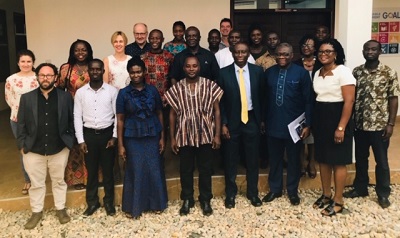Small-Scale Gold Mining in Ghana, 1957-2057
A workshop marks the beginning of a 6-month collaborative project with the University of Ghana on small-scale gold mining

Supported by funding from York’s GCRF pump priming fund Professor Henrice Altink ran a workshop at the University of Ghana from 14-16 January with colleagues from Languages and Linguistic Science and Environment and Geography. The workshop marked the beginning of a 6-month collaborative project with the University of Ghana on small-scale gold mining. About 1 million people in Ghana are involved in this sector, which contributes about 30% of the country’s total gold output. The sector has a negative impact on the environment and public health and has also contributed to an increase in child labour, crime and prostitution. The project aims to provide a tool for the sustainable management of small-scale gold mining in Ghana through an assessment of its socio-economic and environmental impact since the country gained independence in 1957. It consists of three work packages: the Past (led by Professor Henrice Altink and Dr Jesse Ayivor, the Present (led by Professor Paul Kerswill and Gladys Ansah and supported by Dr Josh Kirshner), and the Future (led by Professor Rob Marchant and Dr Nene Kudiychar). Each work package includes arts&humanities, social science and environmental science expertise.
The workshop started with a presentation by Ghana National Association of Small Scale Miners and CityFm, a radio station which ran a social media campaign against illegal small-scale mining in 2016-17. The needs of these key external stakeholders were taken into account when work package leaders and other delegates refined the research questions. Considerable time was also set aside during the workshop to discuss the site for and the practicalities of fieldwork, which will be undertaken by 3 student interns from the University of Ghana. On the final day of the workshop, the research interns received bespoke training in focus groups and interview methods. The project also builds capacity through the employment of 3 research associates – 1 at York Laura Munoz and 2 in Ghana – who will carry out desk-top research and produce a systematic literature review. Initial findings of the project will be presented at a workshop in York at the end of June and result in a policy report that will be shared with relevant stakeholders in Ghana and elsewhere.